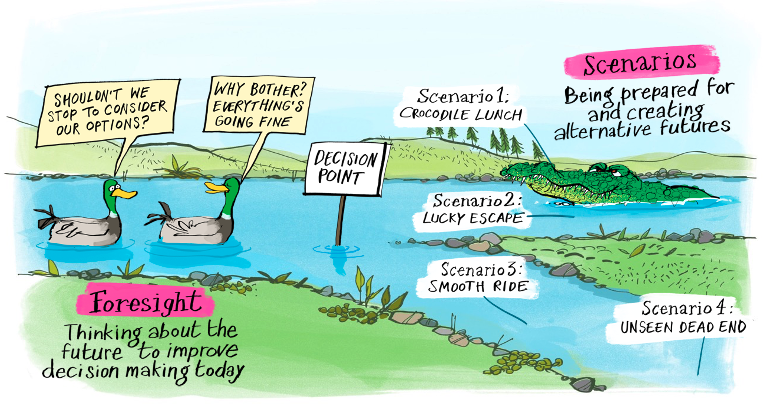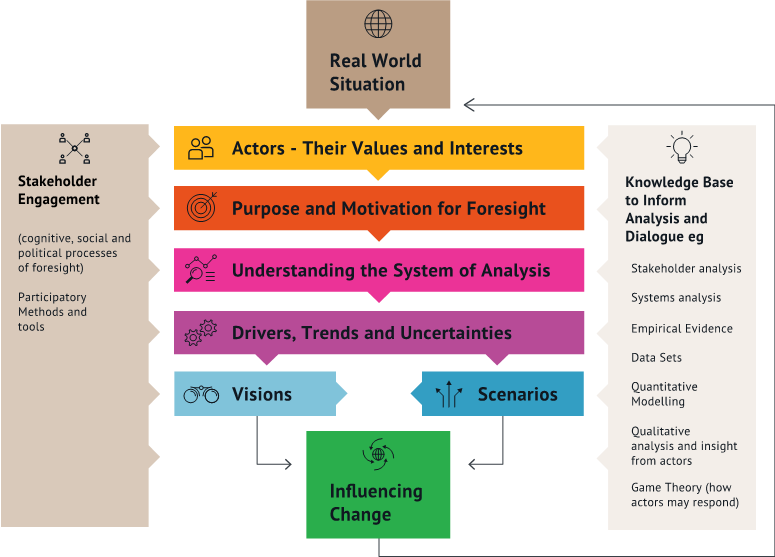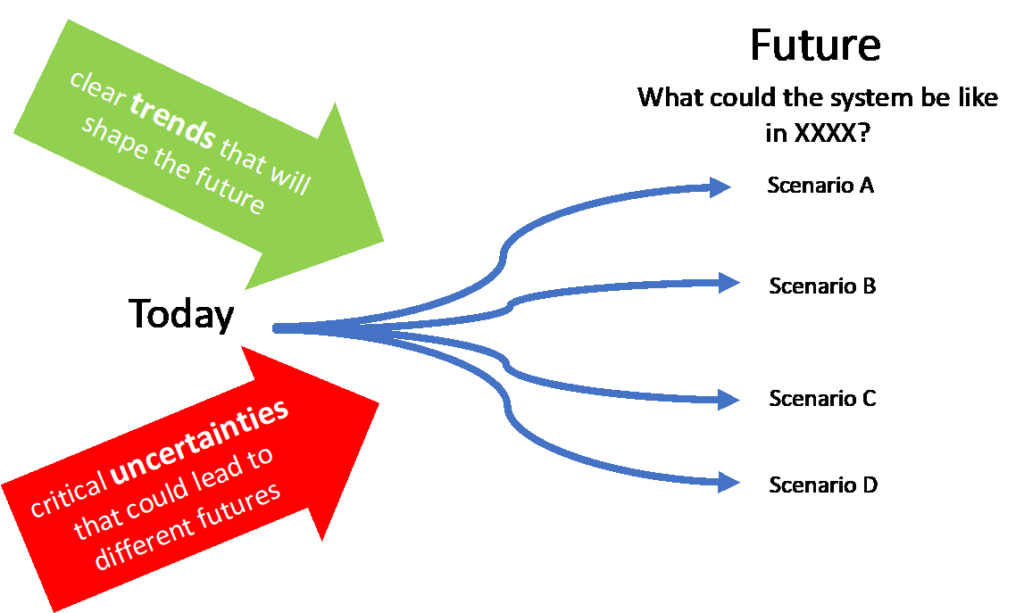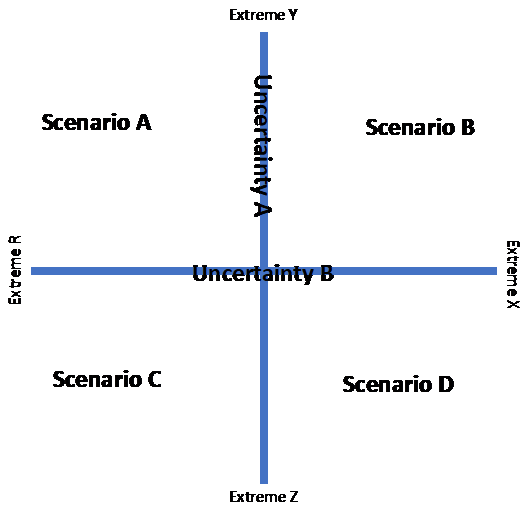By Jim Woodhill, Lead Foresight4Food Initiative
A dramatic and rapid transformation of food systems is necessary to end poverty and hunger, protect the environment, improve rural livelihoods, and ensure resilience to future shocks. This transformation must include structural changes in how our political, economic, social and technological systems function. Such transformative change requires a long-term perspective and understanding of the risks and opportunities in different possible food system futures – the purpose of foresight.
Foresight and Food Systems
Foresight offers one approach to support transformational change for a more equitable and sustainable global food system. It uses futures thinking and scenario analysis to help diverse food system actors (e.g., rural farmers, food manufacturers, small agri-food businesses, governments) imagine, together, how the future might unfold. Considering future scenarios enables possible risks and vulnerabilities to be understood and mitigated. It also enables opportunities for positive food systems transformation to be identified and explored.
Foresight analysis helps to create understanding about how key trends and critical uncertainties (e.g., changing diets, climate impacts, demand for certain foods) could impact food systems. It supports preparedness for different possible futures.
Food systems are extremely complex, with all of the activities of food systems from production to consumption affecting global health and nutrition, environmental sustainability, and livelihoods and employment. Globally, agri-food work is the largest economic sector, employing over a quarter of the world’s workers. The scale alone of global food systems makes achieving change complicated and slow. Fear of the unknown, combined with vested interests of powerful food systems players, can bring resistance to innovation and change. This results in a lack of effective responses to already pressing issues. The challenge Is compounded by the difficulties of creating sufficient collective understanding and commitment among the highly diverse groups involved in food systems.

However, while change often seems slow and difficult, stuck or even regressing, there are endless positive examples of individuals, communities, groups and organisations working for more sustainable and equitable food systems. Especially when the life force of food is involved, people are deeply capable of innovation, creativity, social organisation and activism.
However, while change often seems slow and difficult, stuck or even regressing, there are endless positive examples of individuals, communities, groups and organisations working for more sustainable and equitable food systems. Especially when the life force of food is involved, people are deeply capable of innovation, creativity, social organisation and activism.
While foresight and scenario analysis is no panacea to the complex and overlapping issues within our food systems, it offers two critical contributions:
- Motivation and clarity for change by offering stakeholders a window into the future, through which they can see how their longer-term interests and aspirations would be affected by different future scenarios.
- Helping break down the barriers of vested interests by facilitating stakeholders to collectively explore options and pathways for change that can balance individual and common interests.
The Foresight4Food Approach
The Foresight4Food Initiative has developed a framework and process to guide foresight and scenario analysis for food systems change. The framework (Figure 1) links a participatory process of stakeholder engagement with a strong scientific evidence base and the use of computer-based modelling and visualisation. The approach starts by understanding how food system actors “see” the food system – their actions, values and interests – and their motivation for engaging in foresight. It maps out and examines how social, technical, economic, environmental and political (STEEP) factors interact within food systems, and how food systems are influenced by the power dynamics between actors.

A food systems framing is critical to identify and assess key drivers, trends and uncertainties, to develop alternative future scenarios (Figure 2). The approach creates dialogue between stakeholders about their assumptions on how the future food system may unfold and what this implies for their visions and aspirations. The discussions that ensue provide a foundation for exploring what directions for food systems change would be in the collective interest and how trade-offs or synergies between the specific interests of different groups can be best managed.

Central to this approach is the development and analysis of future food system scenarios, based on data about key trends and critical uncertainties. This is often the most challenging yet insightful part of the process. It takes various actors ‘outside the box’ to imagine how the future of food systems could be fundamentally different, with what implications.
A simple way to develop scenarios is to identify two independent critical uncertainties that then create a matrix of four different scenarios (Figure 3). For example, critical uncertainties in food systems could be dietary changes, climate impacts on agricultural production, malnutrition levels, market and trade functioning, and many others. Scenario story lines are then developed that outline what each of these four futures would be like, based on the two chosen uncertainties. ‘Back casting’ is used to look backwards from an imagined future scenario to construct the possible events and decisions that could have led to such a future.
The framework integrates four elements:
- A futures orientation that invites stakeholders to develop a longer-term perspective on how food systems may unfold in the future, and what decisions are needed today to avoid future risks and build resilience into our food systems.
- Ways of thinking about how change happens in food systems – by linking theories and schools of thought on complex systems, socio-technical transitions, wicked problems, anticipatory governance, cognition, and human bias.
- Practical methods from strategic foresight, scenario planning, multi-stakeholder processes, soft systems analysis, and theory of change.
- Participatory tools for analysis and group facilitation, which enable food system actors to collectively analyse situations and data, create scenarios, engage in dialogue and critical conversations, build trust, and generate pathways of action.

Rethinking Food System Change
Foresight4Food’s approach recognises that elements in the system (i.e., people and nature) interact in complex and adaptive ways; therefore, change in food systems does not occur in easily predicable or linear and hierarchically controlled ways. The complex nature of food systems deeply challenges reductionist mindsets that continue to dominate in public policy making and organisational management. Food systems thinking recognises that change happens through nudging systems, rapid experimentation and learning, and scaling niche innovations. It explores how locked in structures and power relations can be disrupted, yet recognises that building the foundations for desired change takes time, with the eventual outcomes and moments of change being uncertain.
Food systems transformation will require ongoing innovation and learning, with strong networks to obtain feedback and decentralised responsibilities for decision-making and action. Real changes in food systems will depend on shifting underlying structures related to power dynamics, relations between different actors, and the mental models of society, leaders and politicians. Foresight and scenario analysis can help to surface and examine these dimensions of change in a complex and adaptive food system. It is an approach to help generate the critical thinking, leadership and stakeholder engagement needed for food systems transformation.